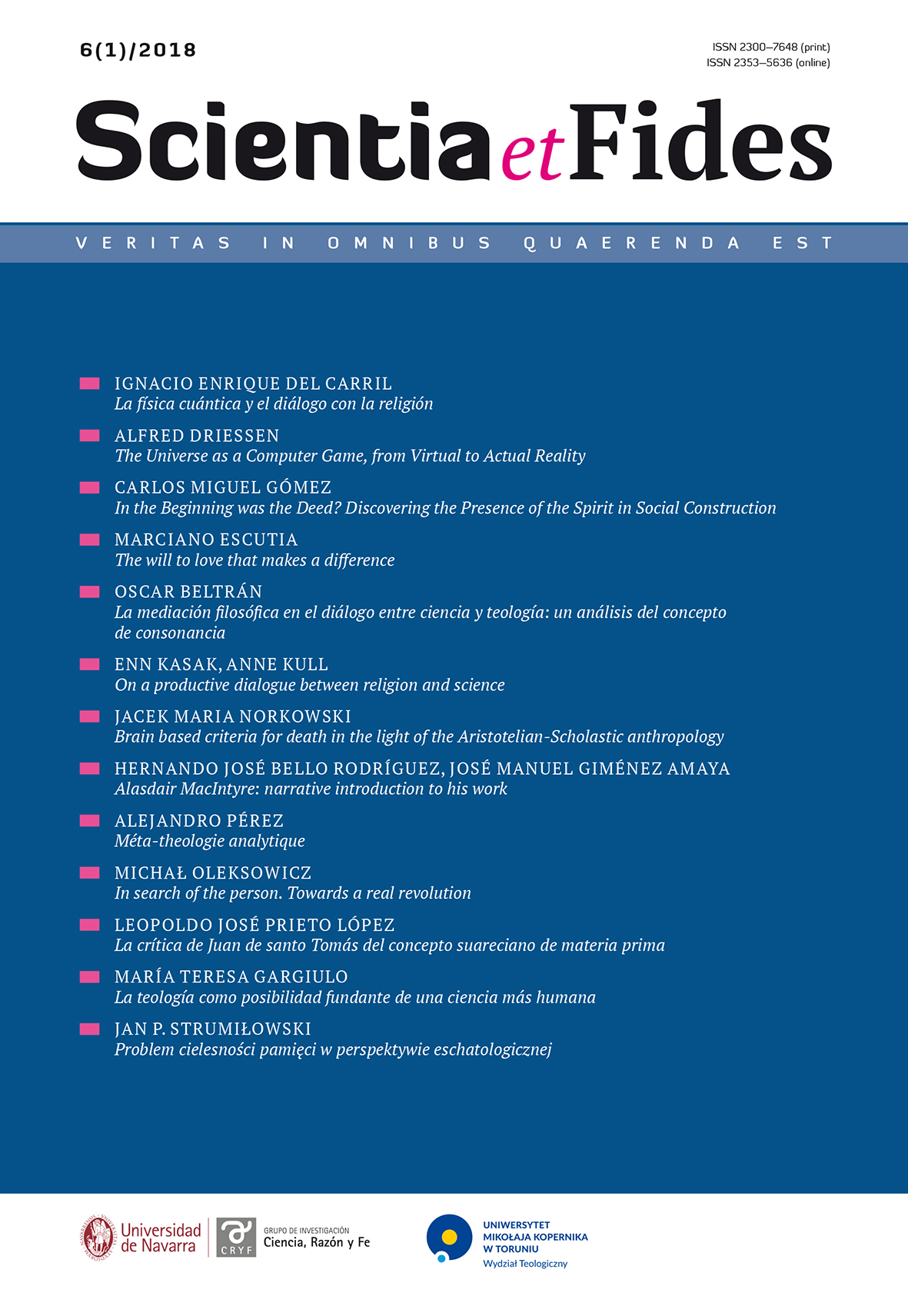The will to love that makes a difference
Keywords
Benevolent love, Personhood, Human DignityAbstract
This essay deals with the question of what really makes human beings exceptional. It is argued that it is a special kind of love that ultimately distinguishes humans from other animals. Although other kinds of considerations, preferably cognitive ones, have most often been invoked to make such a distinction, these might eventually be found to be, at least in part, a matter of degree and not something qualitatively different, as argued here with respect to this type of love. Arguments from both scientific and philosophical sources are brought to bear on the question.References
Alejandro Bonmati, Asier Gomez-Olivencia, Juan Luis Arsuaga, Jose Miguel Carretero, Ana Gracia, Ignacio Martinez, Carlos Lorenzo, Jose María Bermudez de Castro & Edouald Carbonell. 2010. “Middle Pleistocene lower back and pelvis from an aged human individual from the Sima de los Huesos site, Spain.” Proceedings of the National Academy of Sciences. Retrieved at: http://www.pnas.org/content/107/43/18386.full.pdf.
Chomsky, Noam. 2015. Why only us. Cambridge, Massachusetts: MIT Press.
Dawkins, Richard. 1976. The Selfish Gene. Oxford: Oxford University Press.
Jarvis Thomson, Judith. 1985. “The Trolley Problem.” The Yale Law Journal 94, 6:1395-1415
Lewis, Clive Staples. 1953. Mere Christianity. Geoffrey Bles.
Lewis, Clive Staples. 1960. The four loves. Geoffrey Bles Publishers.
Nagel, Thomas. 2012. Mind and Cosmos: Why the Materialist Neo-Darwinian Conception of Nature Is Almost Certainly False. Oxford: Oxford University Press.
Pinker, Stephen. 2008. “The Stupidity of Dignity.” The New Republic. Retrieved May 15th 2017 at: https://newrepublic.com/article/64674/the-stupidity-dignity.
Sapolsky, Robert. 2009. “The uniqueness of humans.” Ted Talk. Available (June 2017) at: https://www.ted.com/talks/robert_sapolsky_the_uniqueness_of_humans
Schwartz, J. & Begley, S. 2002. The Mind and the Brain: Neuroplasticity and the power of mental force. New York: Regan Books.
Sheed, Frank. 1953. Society and sanity. London: Sheed and Ward Ltd.
Singer, Peter. 1985. “Persons and non-persons.” In In Defense of Animals, edited by Peter Singer, 52-62. Basil Blackwell.
Trivers, R.L. 1971. “The evolution of reciprocal altruism.” Quarterly Review of Biology 46:35–57. doi:10.1086/406755.
Wyatt, John. 2009. Matters of Life and Death. Nothingham: IVP Books.
Wyatt, John. 2014. What is a Person? Neuroscience, Human Identity and the Christian Faith. Lecture at the London Institute for Contemporary Christianity. Available (June 2017) at: https://www.youtube.com/watch?v=ZRIddOvdH_4&t=12s.
Downloads
Published
How to Cite
Issue
Section
License
CC BY ND 4.0. The Creator/Contributor is the Licensor, who grants the Licensee a non-exclusive license to use the Work on the fields indicated in the License Agreement.
- The Licensor grants the Licensee a non-exclusive license to use the Work/related rights item specified in § 1 within the following fields: a) recording of Work/related rights item; b) reproduction (multiplication) of Work/related rights item in print and digital technology (e-book, audiobook); c) placing the copies of the multiplied Work/related rights item on the market; d) entering the Work/related rights item to computer memory; e) distribution of the work in electronic version in the open access form on the basis of Creative Commons license (CC BY-ND 3.0) via the digital platform of the Nicolaus Copernicus University Press and file repository of the Nicolaus Copernicus University.
- Usage of the recorded Work by the Licensee within the above fields is not restricted by time, numbers or territory.
- The Licensor grants the license for the Work/related rights item to the Licensee free of charge and for an unspecified period of time.
FULL TEXT License Agreement
Stats
Number of views and downloads: 755
Number of citations: 0



